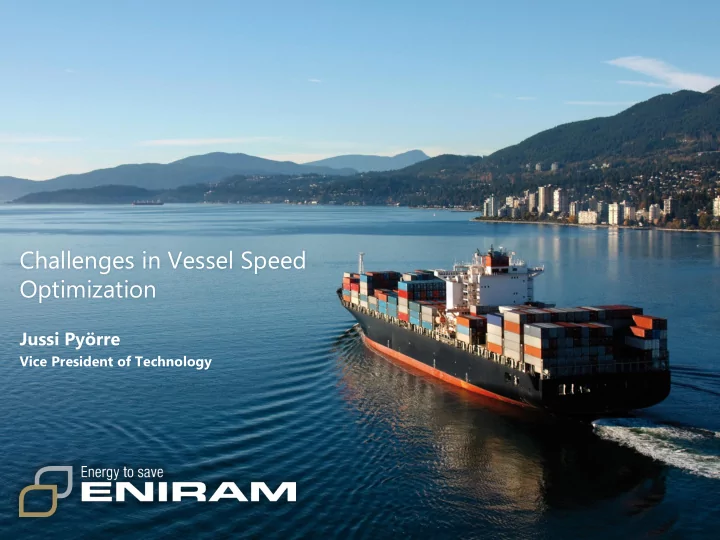

Challenges in Vessel Speed Optimization Jussi Pyörre Vice President of Technology
Eniram in brief Key points Operations by geography Leading provider of intelligent decision support systems and analytics for ships and operator’s Facilities: Helsinki (HQ), Fort Lauderdale, Boston, London, Singapore Sales & Service Partners: Singapore, Hamburg, Oslo, Miami, Shanghai, Genoa Key Facts Major distinctions Current products and services • Established in 2005 • Marine experts, software designers, data scientists, naval architects and captains Eniram Analytics • Enjoying significant growth Eniram Onboard Applications Eniram Performance Managers Management of entire Enables customers to Vessel based system fleets with a consistent for dynamically get more detailed view of improving fuel monitoring and insight into areas of efficiency and reducing optimizing vessel operations emissions performance Eniram offers real-time vessel optimization and strategic guidance to the shipping industry
DATA DRIVEN 150 vessels 60,000 sea days 700M+ measurements / day 9,000 measurements / second
Eniram solutions Dynamic Trimming Assistant Optimum Speed Assistant Vessel Performance Manager Onboard Applications Attitude Sensor information Optimize Navigation Integration to Energy Management Bridge System Follow-up Vessel Platform Automation Integration to Automation Data Center Fleet Performance Manager Fouling Analysis
How to arrive in time – with the least fuel consumed?
Should you ... find optimal currents? ... optimize engine/propeller load? ... slow down on shallow water? ... and how much?
63NM 12 % 25 MT HFO
Engine Speed-Power 25 180 SFOC [g/kWh] 20 175 Power [MWh] 15 170 10 165 5 160 0 155 0 5 10 15 20 50 60 70 80 90 100 Speed [kn] Load [%] Propeller 80% 70% 60% Efficiency 50% 40% 30% 20% 10% 0% 0 0,5 1 1,5 Advance Coefficient
CHALLENGES IN SPEED OPTIMIZATION ETA estimation : changing conditions • Hull, Propeller & Engine : off-design & degradation • Weather forecasts : reliability, accuracy • Obtainable service speed : changing conditions • Hydrodynamic and aerodynamic modelling : accuracy • Data : quality, sufficiency • Frequent speed adjustments • End-user acceptance : ease-of-use, involvement •
Ingredients of Optimization Fuel Operating Constraints Consumption Conditions Model Optimization Algorithm Optimal Speed Profile
Constraints
Ingredients of Optimization Fuel Operating Constraints Consumption Conditions Model Optimization Algorithm Optimal Speed Profile
Operating Conditions
Operating Conditions
Operating Conditions
Ingredients of Optimization Fuel Operating Constraints Consumption Conditions Model Optimization Algorithm Optimal Speed Profile
Fuel Consumption Model Hull Model Engine Model Propeller Model Other Models + Trim, Displacement, Wind, Waves, ... Speed, Weather, Displacement, Fuel Currents, Consumption Trim, ...
Fuel Consumption Model • Predetermined equations • Prior information • Understandable • Rigid • Not adjusting to changing conditions White Box
Fuel Consumption Model • Loosely predetermined • No prior information • Hard to understand • Flexible Black Box
Fuel Consumption Model • Partly predetermined • Prior information • Easy to understand • Flexible • Adjusts to changes Grey Box
Fuel Consumption Model Collected Data Mathematical Model Speed through water Wind direction & velocity, Statistical Analysis RPM, Torque, Hydrodynamic model Trim, List, Draft, Aerodynamic model Rolling, Surging, Pitching, Propulsion model GPS Position ... Engine model Sample Frequency: 1-16Hz ~4,000,000 measurements / day Fuel Consumption Model Given these inputs, what is the estimate for fuel consumption?
Fuel Consumption Example: Squatting Model White Box Grey Box
Fuel Consumption Example: Wind Resistance Model Grey White Box Box
Ingredients of Optimization Fuel Operating Constraints Consumption Conditions Model Optimization Algorithm Optimal Speed Profile
Optimization Algorithm • OpenMDAO (Python) Quality of inputs is • critical for optimization
SPEED THROUGH WATER
CHALLENGES IN SPEED OPTIMIZATION ETA estimation : changing conditions • Hull, Propeller & Engine : off-design & degradation • Weather forecasts : reliability, accuracy • Obtainable service speed : changing conditions • Hydrodynamic and aerodynamic modelling : accuracy • Data : quality, sufficiency • Frequent speed adjustments • End-user acceptance : ease-of-use, involvement •
THE HUMAN FACTOR
THE HUMAN FACTOR Operating Fuel Consumption Constraints Conditions Model Optimization Algorithm Optimal Speed Profile
THE HUMAN FACTOR Eniram delivered reports Dynamic Sea Margin Hull Fouling Analysis Rate-of-Usage Report (ROU) Eniram Fleet Performance Manager Energy KPIs Reporting
THANK YOU! ANY QUESTIONS?
Recommend
More recommend